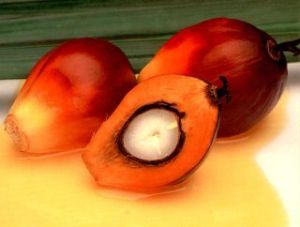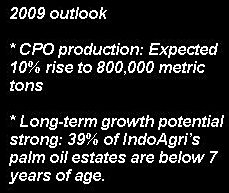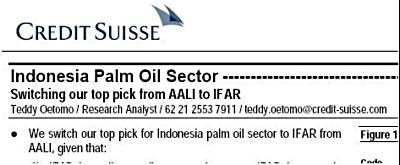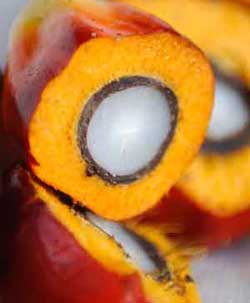
Mark Wakeford, CEO, IndoAgri. Photo by Sim Kih
INDOFOOD AGRI-RESOURCES (IndoAgri) posted a 101.9% increase in its earnings before interest, tax, depreciation & amortization to Rp3.1 trillion (S$479 million) last year.
IndoAgri is a vertically integrated agribusiness group and manufacturer of leading brands of edible oils and fats in Indonesia.
Revenue increased 82% to Rp11.8 trillion (S$1.8 billion), on the back of higher palm prices and increased palm oil sales volume.
The Group registered better performance across all business divisions (excluding fair value gain or loss on biological assets) with the plantation division being the main contributor.
The plantation division posted a 154% rise in revenue to Rp6.8 trillion (includes Rp3.3 trillion from subsidiary Lonsum acquired in FY2007) and accounted for more than 90% of Group’s operating profit.
Sales volume of crude palm oil (CPO) in 2008 also doubled to 730,000 metric tons on the back of contributions from Lonsum and organic growth.
The second largest revenue contributor – the Cooking Oil and Fats Division - recorded revenue growth of 49% as a result of higher selling prices and volume growth.
Following the release of the results on Friday (Feb 27), analysts met up with IndoAgri CEO Mark Wakeford and his management team at IndoAgri's office in The Central on Eu Tong Sen Street.

Palm oil fruit.
Below are some of the questions and answers from the session, where expectations were that CPO prices in 2009 could continue to be volatile. In 2008, prices touched US$1,219 a tonne in March and sank as low as US$488 in November.
Q What is the breakdown of IndoAgri’s Rp2.3 trillion capex planned for this year?
A About Rp 800 billion is for the sugar business – for the sugar plantation and for building a sugar factory. For the Jakarta refinery, it’s Rp300 billion; for completing palm oil mills and upkeep of immature plantations, it’s Rp600 billion. The remaining Rp600 billion is for infrastructure – roads, housing, and general equipment.
That’s the minimum capex for this year and it may be higher, subject to cashflow. The figure doesn’t assume new plantings. We will review our planting programme on a quarterly basis, subject to cashflow.
We had Rp 2.4 trillion of cash at the start of this year, and we expect to generate cash this year.
Q What is the outlook for your cooking oil and margarine business?
A We have seen good demand through Q4 and early this year. We expect 5% growth in cooking oil volume this year.

Source: IndoAgri
Q Will cooking oil margins be affected as a result of Indonesia’s 10% Value Added Tax this year?
A Palm oil prices have come off significantly, and we expect margins to at least be maintained where they are now. Our pricing strategy is driven by CPO prices as they account for the bulk of our cost of production. If CPO prices stay where they are now, our average cooking oil prices will be lower this year than in 2008.
Q Are you expecting a year-on-year decline in CPO production?
A We are expecting year-on-year growth, driven by more maturing trees and increasing yield. We expect growth of 10% to 800,000 metric tons. Beyond this year, the growth potential remains strong given that 39% of IndoAgri’s planted oil palm estates is under 7 years of age.
These estates occupy about 59,000 ha – that’s almost the size of Singapore - and will come into maturity in the next 3 years.
Q Do you have any plan for a rights issue?
A As of today, we don’t have any plans for a rights issue but we are looking at the bond market.
Q What should shareholders be expecting in terms of dividends?
A We decided not to declare a dividend for FY08 because of the uncertain economic climate and CPO prices. We want to preserve cash in the business and continue to invest in our assets and plantings.
For full IndoAgri announcements on its results and 2009 strategies, please visit SGX website.




